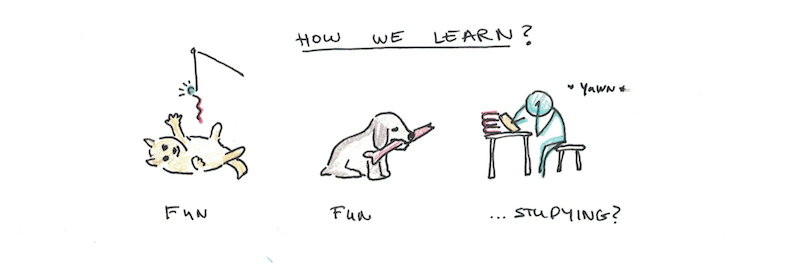Why do we play? Whether it’s games, sports or just joking around, people spend a lot of time playing. Children spend the most time playing, but we continue even after we grow up.
The simplest answer is that playing is fun. Games, sports, hobbies and other activities are enjoyable, and so we like to fill our spare time with play.
But this just pushes the question back. Why do we find play fun?
Animals play too. Dogs wrestle. Cats stalk. Animals of all kinds engage in behaviors we easily recognize as play. And, from this perspective, it’s easier to distance ourselves from the direct experience of playing and look at it from a more objective lens.

What we find is that play is about learning. Play is a way for animals to train skills—hunting, stalking, fleeing, raising children and socializing. Play is the same for human animals as well. Rather than being a superfluous leisure activity, play is important work building the skills which allow us to live in the world.
Why Don’t We See Play as Learning?
If I asked you to think of the best example of learning, I doubt many people would pick playing around. Learning is serious. Play is fun.
I suspect that the reason for this is that school has become such a central example of learning that we tend to think of learning in terms of activities that are most similar to academics. Reading a book = learning. Playing tag = fun, unserious activity.
Yet play is the original learning activity. We engage in it spontaneously because millions of years of evolution have found it to be the most useful way to learn important skills. In contrast, the scholastic mode of learning is and incredibly recent (and not always successful) mode of learning we haven’t been hardwired to enjoy.
Playing > Studying
A good reason for preferring play to study is that playing tends to encourage learning the way our brains actually work.
Consider learning to play a game, like chess.
A scholastic approach would begin with a lecture. You sit and listen as the teacher explains the piece moves, castling and en passant. Forks, pins and skewers. Zugzwang.
Then some homework assignments. Chess problems. Memorize opening patterns. “What is the King’s Indian Defense?” Problem sets to be handed in Monday, graded for the following week.
All this culminating in some kind of final exam—a thorough test of the definitions, concepts and ideas presented in the class, and no more. After all, to test you on something you hadn’t been taught would be unfair.
Compare this to just playing a lot of chess. Perhaps this latter strategy would miss some opportunities, but it does vastly better than the hypothetical chess pedagogy above.
The reason playing chess trumps the formal academic approach is that to play chess you must transfer knowledge and skills to actual games. Play, by simulating real chess, does this quite well. Study, by memorizing and reviewing abstract concepts, does not—and so it often fails to make an impact when you’d naively expect it would.
Your Study Should Be More Like Play
Nobody teaches chess this way. We understand that, at the very least, you must play some actual chess games. Memorizing concepts, definitions and abstracted problems isn’t enough.
But is this not how we teach languages? Mathematics? Science? History? The above formula is played out for most subjects, yet the critique for chess applies to them as well.
If you want to learn something deeply and well, your studying needs to look more like play. Fiddling with things. Inventing challenges and struggling to solve them. Imagining what-ifs, how-abouts and why-nots.
Play is how you were meant to learn. You enjoy play because you enjoy learning. Most people dislike formal study because, outside of the classroom, it’s not a terribly efficient way to learn.
Richard Feynman: Master of Play
It’s easy to think of games like chess as being learned by play. But how could you learn a serious subject, like physics, through play?
This, I’ll argue, is how famous physicist Richard Feynman learned it. It started as a child, repairing radios that had broken down. Tinkering and fiddling led to recognizing that you could solve things by thinking about them.
Later, as a student, he would invent problems for himself. Why does a spinning plate wobble the way it does?
Finally, it got applied to the deepest problems in physics, eventually winning him a Nobel prize.
Feynman is a vivid example, but most great thinkers, scientists and artists learned through play. Whenever you’re learning anything, if you can ask yourself, “How do I make this more like a game? How do I tinker, experiment, imagine and fiddle around with this?” you’ll be much better off than if you merely study.


 I'm a Wall Street Journal bestselling author, podcast host, computer programmer and an avid reader. Since 2006, I've published weekly essays on this website to help people like you learn and think better. My work has been featured in The New York Times, BBC, TEDx, Pocket, Business Insider and more. I don't promise I have all the answers, just a place to start.
I'm a Wall Street Journal bestselling author, podcast host, computer programmer and an avid reader. Since 2006, I've published weekly essays on this website to help people like you learn and think better. My work has been featured in The New York Times, BBC, TEDx, Pocket, Business Insider and more. I don't promise I have all the answers, just a place to start.